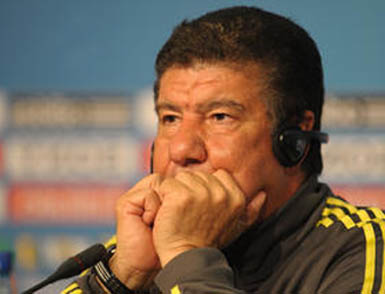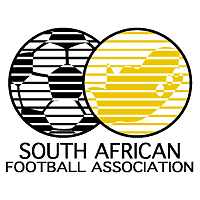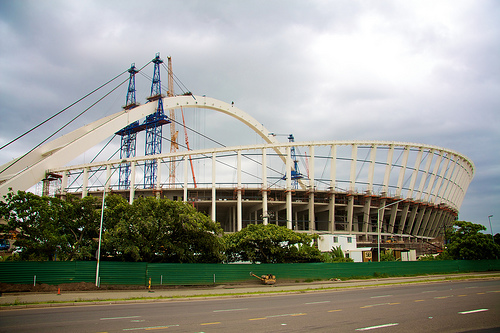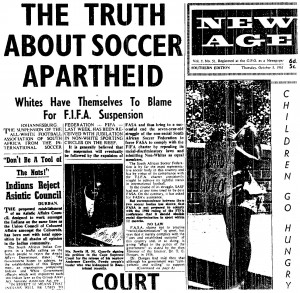
Bafana’s Brazilian coach, Joel Santana, is out of a job. Pallid performances and pitiful results sunk the former Flamengo coach. “In the bigger picture and the interest of the country,” said Mandla Mazibuko, SAFA vice-president, “he [Santana] realized while he was doing his best, his best was not good enough.”
Hand-picked by Bafana’s previous coach and fellow brasileiro Carlos Alberto Parreira, Santana lasted 18 months at the helm of the national side of the 2010 World Cup host country. His most notable achievement was a 4th-place finish in the 2009 Confederations Cup, which some critics opined was assisted by a lucky draw that placed South Africa in a group with minnows New Zealand and Iraq.
Football-mad South Africans have every reason to be worried. A few months before the World Cup and Bafana are rudderless and adrift. SAFA’s decision about Santana’s successor may be announced on Friday. Parreira is lurking in the shadows.
Update (10/24/09): Back to the Future : Parreira’s officially back.
Tag: South Africa

Kick Off magazine reports that Kirsten Nematandani emerged victorious in the contentious SAFA presidential race during a marathon annual general meeting in Joburg. Nematandani was elected unopposed after 2010 LOC Chief Executive Officer Danny Jordaan and Chairman Irvin Khoza withdrew from the race.
In South African football circles, the outcome of this hotly contested election (more than 100 police officers searched delegates at the Southern Sun hotel for weapons), was widely seen as a victory for Danny Jordaan’s Football Transformation Forum at the expense of PSL boss Irvin Khoza. According to the Mail and Guardian, the new SAFA chief may face a legal challenge, but aims to go ahead and meet soon with SA president Jacob Zuma, Minister of Sport Makhenkesi Stofile and FIFA president Sepp Blatter to outline the way forward for South African football.
Sept. 29 update: press conference erupts in chaos as PSL issues statement declaring Safa’s presidential election to be unconstitutional and illegitimate. No comment from FIFA.
From Reuters:
CAPE TOWN, Sept 17 (Reuters) – South Africa faces a funding shortfall of 2.3 billion rand ($315 million) for six new stadiums built for next year’s Soccer World Cup, Finance Minister Pravin Gordhan said on Thursday.
South Africa, in its first recession in 17 years, is the first African country to host the world’s most watched sports spectacle, starting next June.
“National Treasury has informed me of the projected shortfalls for the 2010 FIFA World Cup stadiums. The total shortfall on the six new stadiums is 2.33 billion rand as of July 2009,” Gordhan said in a written response to a question in parliament.
The funding shortfall comes on the back of accommodation, transport and security concerns raised by FIFA, soccer’s world governing body.
Gordhan said contractual responsibility rested with South Africa’s 10 host cities to deal with rising costs, and it would be “clearly unreasonable” for national government to take full responsibility for reimbursement of rising costs. “Only one of the new stadiums is likely to be completed within budget,” he said, without specifying which stadium. Soccer City, where the finals will be played in Johannesburg, accounted for almost half of the total shortfall at 1.26 billion rand, he said.
Diego Maradona and the decline of Argentina
Yesterday Brazil beat Argentina 3-1 in Rosario, Argentina. Brazil qualified, but Argentina is just about holding onto the fourth automatic qualifying place for South Africa 2010. (The fifth placed Conmebol or South American team will face CONCACAF’s 4th placed side in a home-and-away play-off. The Americas could provide a tasty appetizer for South Africa: Argentina vs. Mexico anyone? Or get the popcorn out for the USA against Venezuela!)
Argentina has some tough qualifying games ahead (particularly Paraguay, and a trip to the Centenario in Montevideo). This could be the first time they fail to qualify since 1970. They are coached by one Diego Maradona, God to some Argentinian (and all Scottish) fans. And some observers and the country’s fans (this is sacrilege of course) think he (gasp) is the problem.
A Test of Faith in Argentina.
Dios Mio! Argentina in Trouble.
Critics round on Diego Maradona after Brazil twist knife against Argentina
South Africa and FIFA: Defining Moment
FIFA’s suspension of South Africa from world football in September 1961 was one of the first international indictments of apartheid. Click here to read a recent piece on this major event in The Financial Times of London. It is a powerful example of how Africans accelerated the democratization of football and made the game more fully global.
Christopher Merrett

Football is often described as the “beautiful game”. Indeed, it is. As Michael Worsnip pointed out recently (The Witness, June 12), football on the local recreation ground reduces the possibility that young people will be tempted into crime. And, of course, South Africa will host a successful Fifa World Cup next year — if it tries hard enough. All of this is obvious. But what is crucially missing from public debate are a number of awkward political, economic and social questions.
New documentary on 2010 World Cup
Trailer for Fahrenheit 2010 – Warming Up for the World Cup in South Africa on TrailerAddict.
FAHRENHEIT 2010: WARMING UP FOR THE WORLD CUP IN SOUTH AFRICA
directed by Craig Tanner, Australia/South Africa (2009) documentary
The measured Fahrenheit 2010 systematically examines the expectations of a variety of South Africans on the country’s staging of the 2010 FIFA World Cup. Focal points of the film are South Africa’s socio-economic disparities and debate as to whether the erection of state of the art sports arenas will leave the country with white elephants which it can ill afford. Interviewees include Danny Jordaan, Desmond Tutu, Michael Sutcliffe, Jomo Sono, Dennis Brutus and also, amongst others, construction workers, street traders, soccer players and the sangoma with the answer to Bafana Bafana’s woes.
